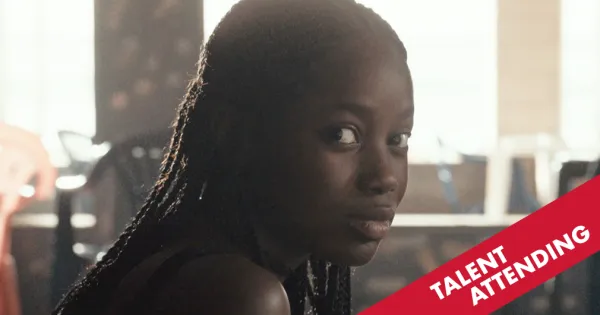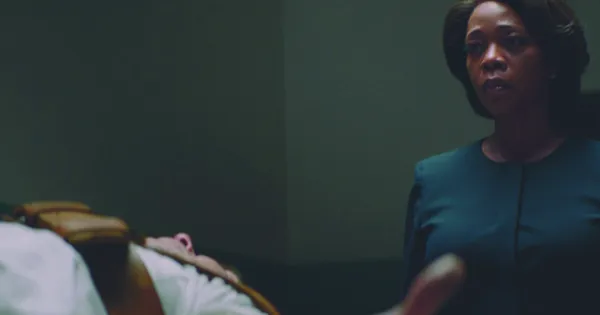The American Film Institute’s annual film festival is arguably Los Angeles’ best and most comprehensive annual fete of feature, documentary, short, animated, domestic and foreign cinema, plus panels and parties, taking place in Hollywood from Nov. 14-21. Here are capsule reviews of some of AFI Fest 2019’s myriad productions.
CLEMENCY: Film Review
Dead Woman Walking: A Capital Film on Capital Punishment
[NOTE: This review may contain plot spoilers.]
With her first full-length feature film, Chinonye Chukwu’s Clemency is a gripping death penalty drama. (Her 2012 Alaskaland was only 75 minutes long.) The movie opens and closes with a legally sanctioned execution that is botched at a prison (after a screening the writer/director told the AFI audience that Clemency was shot on location in a penitentiary no longer in use, which enhances and heightens the movie’s realism).
Aldis Hodge (Brian Banks, Hidden Figures) depicts Anthony Woods, who claims he is on death row for a murder he didn’t commit. Richard Schiff (The West Wing) turns in yet another one of his stellar supporting role parts as a beleaguered man of conscience, portraying Woods’ defense attorney. Marty Lumetta is desperately trying to save his client’s life, filing appeal after appeal as the literal deadline for Woods’ execution nears.
But they are not the protagonists of this tragedy. Alfre Woodard (Spike Lee’s Crooklyn, Grand Canyon, Passion Fish, et al), one of our elder stateswomen of thespianism, delivers a powerhouse of a performance as the prison warden, Bernardine Williams, Clemency’s main character. It requires an actress of Woodard’s immense stature to convincingly pull off depicting an African American female warden in sexist, racist AmeriKKKa, but Alfre - who has previously portrayed Winnie Mandela, Harriet Tubman and President Constance Payton in the State of Affairs TV series - acquits herself well.
However, Woodard creates a nuanced, complex character whose bleak job casts a gloomy shadow over her troubled private life. Williams drinks too much and is having marital problems with her husband Jonathan (Wendell Pierce, who was such a joy to behold as the philandering jazz musician Antoine Batiste on HBO’s excellent Treme series). In their first scene together it appears that Jonathan is sexually dysfunctional - so the woman who metes out death is unable to experience sexual satisfaction with her husband. Paging Dr. Freud!
Actually, Chukwu’s screenplay reminded me of psychoanalyst/ revolutionary Frantz Fanon’s The Wretch of the Earth, considered to be the bible of Third World liberation. Not because Woods is an oppressed Black man who claims to be innocent of the murder he is set to be executed for and supporters are seen/heard railing and rallying against capital punishment outside the prison - but in that Fanon insightfully wrote how torture not only affects the victims of it, but of the perpetrators of these crimes against humanity, too. In the same way Williams’ job is taking its toll on her and in a couple of scenes she tellingly doesn’t respond to people calling her “warden,” but does when she’s called “Bernardine.”
Warden Williams is grappling with her humanity as the inhumanity of her job requires killing human beings. Perhaps the title Clemency refers more to her than with a last minute reprieve from the governor for a death row inmate about to be snuffed by the government, with Bernardine seeking merciful dispensation to rescue her from her role as a state-condoned executioner.
In the grand finale, another execution takes place just off camera as we just watch Alfre Woodard’s facial reactions in close up in the death chamber, rather than cut to the inmate being executed. In a post-screening Q&A Chukwu told the AFI audience this was in part because she was sick and tired of seeing dead Black people onscreen. Well, in all due respect, if this is the case Chukwu might have chosen the wrong genre to write and direct. Although Woodard is a great enough artist to pull this scene off, it is arguably a mistake to exclusively focus - literally - on the executioner, not on the victim.
Having said that, Clemency is definitely a well-written, well-directed, well-acted picture. But I couldn’t help but wonder: How many ticket buyers will plunk down the price of admission to see this almost two-hour-long stark cinematic excursion into the death penalty? Especially considering that key elements of the demographic who’d likely be interested in seeing Clemency can’t go to a theater to do so because they’re like, you know, locked up on death row or, even worse, dead. Especially as this realistic but disturbing movie is being, rather remarkably, released around Christmas. (Who’s the marketing genius who came up with that brainstorm?) We’ll see if there are audiences with strong enough stomachs for this worthy but grim drama about the grim reaper on Dec. 27 when Clemency is scheduled to be released.
For more info: http://www.afi.com/afifest/.
The third edition of “The Hawaii Movie and Television Book”, co-authored by L.A.-based reviewer Ed Rampell, is available at: https://mutualpublishing.com/product/the-hawaii-movie-and-television-book/.
ATLANTICS (ATLANTIQUE): Film Review
An African Get Out Type of Movie
Mati Diop’s Atlantics is a clever, creative film that - like Jordan Peele’s 2017 Get Out and 2019 Us - takes a look at a topical issue through the lens of horror movie genre conventions. Whereas Peele peeled back the layers of American racism and class inequality, Diop is tackling the mass migration wave that swept Europe starting around 2015. Although many of the migrants and refugees came from the Middle East, Diop focuses on undocumented “aliens” from Senegal, the Paris-born co-writer/director’s ancestral homeland where Atlantics was shot on location. Atlantics is also in part a policier, and as such has attributes of a police procedural.
By inserting supernatural and detective story elements into her movie, with ghostly and zombie-like effects, Diop presumably makes Atlantics more accessible to non-African moviegoers. Indeed, Atlantics is the very first film directed by a Black woman to be nominated in the Cannes Film Festival's 72-year history for its prestigious top prize, the Palm D'Or, and won Cannes' Grand Prix.
Entirely set in Dakar Atlantics also deals with forced abstinence (including medieval virginity tests), arranged marriage, exploitation of workers, class inequality, arson and more. Being cheated by a Senegalese capitalist (proving once again that pigs come in all colors) prompts Black proletarians to embark on a desperate, disastrous voyage to Europe in quest of better jobs. The nonprofessional cast, which includes Mame Bineta Sane as 17-year-old Ada (who at times seems possessed), lends authenticity to this film, as does the fact that the languages spoken are Wolof (Senegal’s indigenous tongue) and French, with English subtitles.
With her feature film directorial debut, the young Diop - who is already an accomplished actress in France - proves with Atlantics she also has a bright future as a metteur en scène (movie director).
For more info: http://www.afi.com/afifest/.
THE TWO POPES: Film Review
The God Couple
Brazilian director Fernando Meirelles, who was Oscar-nominated for 2002’s City of God and Golden Globe-nommed for 2005’s The Constant Gardener, is back with another topical film, The Two Popes. At a gala in the TCL Chinese Theatre, 81-year-old Anthony Hopkins - who portrays Pope Benedict - told the AFI audience Popes had a “message” of “tolerance,” which Meirelles noted was extremely needed nowadays. Hopkins’ fellow Welsh thespian and co-star as Argentina-born Pope Francis, Jonathan Pryce (who played another religious leader, High Sparrow, in HBO’s Game of Thrones, as well as another Argentine, Juan Peron, in 1996’s Evita), also attended the screening, which was one of AFI 2019’s highlights.
This two hour-plus fact-inspired (if not based film) written by three-time Oscar-nominee Anthony McCarten (who wrote the biopics 2014’s The Theory of Everything about physicist Stephen Hawking, 2017’s Darkest Hour about Winston Churchill and 2018’s Bohemian Rhapsody about Freddie Mercury) includes some news clips in dramatizing the real life relationship of the German-born Pope, Cardinal Joseph Aloisius Ratzinger and his much more liberal, Buenos Aires-born successor is an actors’ movie. Rachel Weisz won the Best Supporting Actress Academy Award for The Constant Gardener and Hopkins was Oscar-nommed three times and won the coveted Golden statuette for 1991’s The Silence of the Lambs. Don’t be surprised if both Sir Anthony and Pryce are nominated for Best Actor for their superlative work in this film about the two Bishops of Rome.
For a movie about godliness Popes is full of humanity. It is also extremely philosophical, although not overly religious. However, one will learn fascinating details about how the pontiff is chosen by the conclave of cardinals, and so on. There is also a highly informative subplot about Argentina’s military junta and the questionable role of Jorge Mario Bergoglio (portrayed as a young Jesuit by Argentine actor Juan Minujin) during the state terrorism of the so-called “Dirty War” from 1976-1983, decades before he became known as Pope Francis, the papacy’s first South American leader. I learned a lot about this period of harsh repression from the film, and it does moviegoers a service in dramatizing these forgotten, fascistic events. However, for some reasons there are no flashbacks to Ratzinger’s past during the Third Reich.
Pope Francis named himself after my favorite saint, who gave his wealth away to the poor and spoke with the animals. In sharp contrast to the traditionalist Pope Benedict, derided by some in the movie (as in real life) as a “Nazi,” when he served as a cardinal and eventually as Holy Father, Bergoglio publicly eschewed ostentation and ornamentation, relaxed the ideological war on gays, and supported other reforms, earning the popular nickname of “the People’s Pope.” Bergoglio became the head of state representing the Holy See when the Vatican was rocked by banking and sexual molestation scandals. Their differences and relationship are captivating, especially considering the fact that two men who became pope haven’t been alive at the same time in 600 years.
The film also features sumptuous cinematography with South American and Roman locations, including aerial exterior shots of Vatican City. But the Vaticano interiors, including what seems to be the majestic Sistine Chapel by my favorite artist, Michelangelo, are recreated at Cinecitta Studios.
Given its subject matter, Popes is well-timed for a Christmas release on Dec. 20. With a billion-plus Catholics worldwide, this papal epic may have a built-in audience. However, some popcorn munching denizens of the multi-plex used to far more dynamic superheroes may consider this to be a snooze-fest about two old geezers gabbing with each other - even if their conversations are about the nature of god, Christianity, and other topics of import. Although about half an hour could arguably be cut out of The Two Popes, I nevertheless enjoyed it - and was thrilled to see, Hannibal Hopkins, the brilliant actor who played Captain Bligh in 1984’s The Bounty, in person. Shiver me timbers!
For more info: http://www.afi.com/afifest/.
The third edition of “The Hawaii Movie and Television Book”, co-authored by L.A.-based reviewer Ed Rampell, is available at: https://mutualpublishing.com/product/the-hawaii-movie-and-television-book/.





